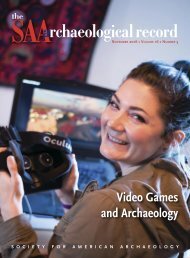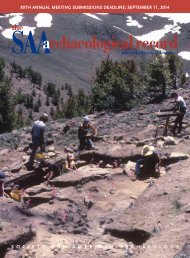SAA
SAA_Record_Nov2015
SAA_Record_Nov2015
You also want an ePaper? Increase the reach of your titles
YUMPU automatically turns print PDFs into web optimized ePapers that Google loves.
PROS AND CONS OF CONSULTING COLLECTORS<br />
1. Do not loot, or buy or sell artifacts for the sake of possession<br />
or profit;<br />
2. Agree to maintain reasonable documentary standards<br />
(even if they did not before we reached out to them);<br />
3. Freely open their collections and documentation for study<br />
and recording.<br />
Obviously, what constitutes reasonable documentary standards<br />
and access to collections are matters for discussion.<br />
With reservations, we also prefer that collectors make some<br />
arrangement for permanent curation. Curation is forever,<br />
and so are its costs. Encouraging collectors to arrange permanent<br />
curation of their collections may seem to tax already<br />
overburdened resources. Many collections will not come our<br />
way even if we wanted them, but some might, further<br />
stretching limited resources. But the collections exist and,<br />
following <strong>SAA</strong>’s ethical mandates to preserve the record, the<br />
profession bears some responsibility for their curation.<br />
Either we use our wits to meet the challenge, or throw up our<br />
hands in despair.<br />
In our judgment, the salient distinction is not between professional<br />
and amateur, however the latter term is defined,<br />
but between responsible and irresponsible archaeological<br />
practice. We believe that collectors who meet these minimal<br />
standards are responsible, and those who might meet them<br />
after being educated are responsive. Accordingly, to us the<br />
constituency to address is nonprofessional but responsible or<br />
responsive collectors.<br />
The Ethical Argument for Collaboration<br />
We do not minimize the pernicious effects of commercialization<br />
or condone the irresponsible acts that damage and<br />
destroy the archaeological record without documentation.<br />
We do not advocate abandoning or compromising ethical<br />
standards, nor do we recapitulate Pitblado’s (2014:386-391)<br />
exegesis of <strong>SAA</strong>’s Principles of Archaeological Ethics 1 (1996) in<br />
support of collaboration with the responsible or responsive.<br />
Instead, we make several narrower points to ground an ethical<br />
stance that we believe not merely allows, but requires, us<br />
to take seriously the need to engage with private collections<br />
(see also LaBelle 2003).<br />
• Principle 1 urges us to pursue “the long-term conservation<br />
and protection of the archaeological record by practicing<br />
and promoting stewardship of the archaeological<br />
record” and to “promote public understanding and support<br />
for its long-term preservation.” Private collectors<br />
hold much, and a disproportionately informative portion,<br />
of that record. Principle 1 demands that we deal with the<br />
reality of private collections and make serious efforts to<br />
preserve the artifacts and contextual information they<br />
possess, as McKern et al. (1935:1-2) argued at <strong>SAA</strong>’s<br />
founding, echoed by Guthe (1967) in his retrospective<br />
account of that event. It also demands the public outreach<br />
that <strong>SAA</strong> advocates toward metal detectors but not, to<br />
date, responsible and responsive collectors at large.<br />
• Principle 4 advocates public education, both for its own<br />
sake and to promote preservation. Educating responsive<br />
collectors is an effective way to promote preservation, as<br />
McKern et al. (1935:3) argued at <strong>SAA</strong>’s founding.<br />
• Principle 7 concerns preservation of records. It does not<br />
require that the records be professional, be made or<br />
maintained by <strong>SAA</strong> members, or otherwise delimit the<br />
scope of records to preserve. All private collectors have<br />
artifacts and the responsible have records of their collections;<br />
both must be preserved, as McKern et al. (1935:4)<br />
argued at <strong>SAA</strong>’s founding. This cannot always involve<br />
professional curation of the vast private collections. It<br />
does, however, justify systematic digital documentation of<br />
collections.<br />
• Principle 3 rightly condemns commercialization of artifacts.<br />
This does not mean stiff-arming collectors. Instead,<br />
it involves educating responsive ones on the harmful<br />
effects of artifact commerce and on collections’ intrinsic<br />
documentary value, which in turn promote good practice,<br />
as McKern et al. (1935:1,3,4; see also LaBelle 2003:124)<br />
advocated at <strong>SAA</strong>’s founding.<br />
<strong>SAA</strong>’s Original Position on Private Collecting<br />
“<strong>SAA</strong>’s founding” occurred four times in the preceding section,<br />
so it seems wise to revisit that event. <strong>SAA</strong> was founded<br />
by an alliance of professional archaeologists and interested<br />
responsible or responsive collectors (for their day) and its<br />
rationale in part was to promote better communication and,<br />
arguably, collaboration between those groups. In describing<br />
the sentiments that animated <strong>SAA</strong>’s founding, we cannot<br />
improve upon the words expressed in the first paragraph<br />
ever published in American Antiquity. The journal’s purpose<br />
was to be “an instrument of value in coördinating the<br />
research efforts of all sincere students of American archaeology,<br />
and in greatly encouraging an improved understanding<br />
and friendly coöperation between such students, professional<br />
and amateur” (McKern 1935:1). Guthe’s retrospective<br />
account echoed these sentiments; he helped found <strong>SAA</strong><br />
because, “Impressed by the attitude and accomplishments of<br />
… earnest amateurs, I felt they deserved to be helped rather<br />
than censured” (1967:434).<br />
12 The <strong>SAA</strong> Archaeological Record • November 2015




